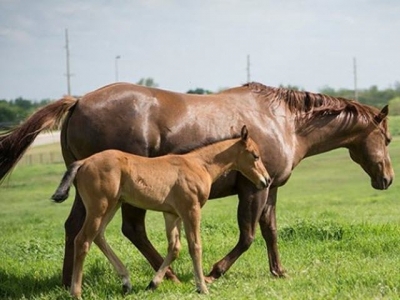Optimize water intake for horses this summer

Like people, horses young and old have their own preferences when it comes to staying hydrated and may need to drink more than their owners might assume. (Photo by Todd Johnson, OSU Agricultural Communications Services)
Consider manner in which water is provided to horse to encourage intake
Excessive summertime heat has rolled into much of the U.S., making it paramount that equine owners optimize their horse’s water intake to ensure animal well-being and performance.
“Ensuring a horse consumes adequate water is not always easy, given how the animal’s water needs can vary greatly according to diet, temperature and amount of exercise,” Oklahoma State University Cooperative Extension equine specialist Kris Hiney said.
First of all, consider the manner in which water is provided to the horse. Modern management systems are quite different from where a horse naturally would drink water, such as streams, ponds, etc. Automatic systems may be time savers for horse managers, Hiney said, but what do the animals actually prefer?
“Many horse managers acknowledge that horses enjoy drinking from buckets far more than automatic water systems, and this has actually been borne out in the scientific literature,” Hiney said. “Given a choice, horses prefer buckets over automatic waterers almost exclusively.”
Furthermore, the type of water provider also may influence a horse’s drinking behavior. In a study of horses never exposed to automatic waterers, the animals preferred float-valve waterers compared to push valves. Push-valve waterers are those in which a horse must use some force of its muzzle against the valve.
“In that study, horses never consumed water from the push valves,” Hiney said. “It was believed the larger available reservoir of water in the float-valve waterers encouraged the horses to drink more.”
In addition, push valves have a somewhat startling effect due to the noise of water refilling the waterer; horses were reluctant to return to the waterer after being startled.
“To make things even trickier, the normal intake rate of water by a horse actually exceeds the flow rate of most waterers,” Hiney said. “Therefore, a horse would need to drink much more often when using a low-flow waterer. This may actually cause the horse to reduce its intake compared to being offered water in a bucket.”
Hiney added that this does not mean automatic waters should not be used, but when selecting a waterer, look for one that maintains a larger reservoir of water or has a larger surface area. Try to find a quiet waterer as well.
“Horses can learn to use push-valve waterers, but during the training period, careful observation should be employed to prevent animal dehydration,” she said. “It also may be helpful to install a monitoring system in the pipeline feeding the waterer so that water consumption can be monitored.”
Adjust for travel
Traveling with horses also is a key time to closely monitor water intake, especially during long trips. Horses may reduce water intake for a number of reasons, Hiney said. Stress, unfamiliar flavors of water, reduced feed intake and increased water losses may all create a state of dehydration.
“Often during travel, horses will reduce their feed intake, which subsequently reduces water intake,” Hiney said. “Reduction of water intake may lead to dehydration as horses typically increase water losses through sweating while trailering.”
In addition, equine owners need to consider how much muscular work a horse must perform to balance long trips. Reduction of water availability may decrease a horse’s desire to eat as well.
“It’s important to break this cycle of reduced feed and water intake to ensure a healthy, happy horse when it reaches its final destination,” Hiney said.
Since a horse may be reluctant to consume water that has an unfamiliar flavor, the addition of a flavoring agent can get the horse accustomed to a unique flavor that can mask new tastes. However, Hiney recommended that any introduction of a flavoring agent be done at home prior to the trip. Horses accept new flavors more readily when they are not stressed and are in a familiar environment.
"Use a training period prior to travel so that you do not discourage your horse from drinking,” she said. “In a test between apple and clover flavors, horses clearly preferred to drink apple-flavored water. There are multiple products available, so choose one your horse likes.”
Horses also drink when they eat, so it is important to offer water simultaneously.
Có thể bạn quan tâm
 Lallemand optimizing rumen efficiency measuring tools
Lallemand optimizing rumen efficiency measuring tools It is now in the process of generating mobile app versions of its rumen efficiency investigation (REI) audit tool for both the dairy and beef sectors
 Canada sees multiple pathways to sustainable beef
Canada sees multiple pathways to sustainable beef Technology, third-party audits, multiple stakeholders and financial incentive are all elements playing a role in developing a sustainable beef industry
 US researcher tracks alternative preventatives for cattle liver disease
US researcher tracks alternative preventatives for cattle liver disease Methods based on dietary adjustments, essential oils and vaccination may provide possible alternatives to the continued use of antibiotics to address